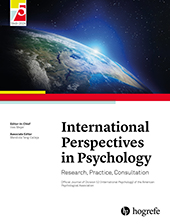Cross-Cultural Collaborative Translation/Adaptation of Assessments Via International Working Groups
A Case Study With the Cognitive and Linguistic Scale
Abstract
Abstract: Most neuropsychological assessments are developed in English, yet nearly 95% of the global population are not native English speakers. To further compound this problem, translating and adapting assessments is a complex, expensive, and time-consuming process that few individual psychologists can undertake on their own. To overcome these obstacles, we formed an international consulting group of bilingual pediatric rehabilitation/hospital clinicians to translate and adapt a common assessment of cognitive recovery, the Cognitive and Linguistic Scale (CALS), for use with youth in three linguistic/cultural groups: Spanish-speaking youth residing in the United States, Dutch-speaking youth residing in the Netherlands, and Hebrew-speaking youth residing in Israel. We describe the collaborative process of translating and adapting the CALS for the respective populations following the first two stages of the International Test Committee guidelines (Precondition and Test Development). We also present new, more culturally accessible versions of visual stimuli that can be used across many linguistic/cultural groups in the Western world. Initial examination of responses from a preliminary pilot sample of US youth (N = 11) supported the acceptability of the Spanish translation and new visual stimuli. Next steps for each translated/adapted version of the CALS are discussed, including plans for validation in each respective population. We hope this overview will serve as a model for other groups to help decrease the translation burden on individual clinicians and promote higher-quality translated/adapted assessments that better serve diverse and often underserved patient populations.
Impact and Implications:
We describe our international consulting groups’ process of translating/adapting a measure of cognitive recovery for use with youth in three diverse linguistic and cultural groups and provide preliminary evidence to support the acceptability of the Spanish translation. Our cross-cultural collaborative approach to translation/adaptation decreases the translation burden on individual psychologists and promotes the development of higher-quality neuropsychological assessments for underserved linguistic populations. We hope this work will serve as a model for other teams interested in translating/adapting measures for diverse cultural-linguistic groups and thus reduce inequality in the access to neuropsychological assessment services within and across cultures.
References
(2018). ITC guidelines for translating and adapting tests (2nd ed.). International Journal of Testing, 18(2) 101–134. 10.1080/15305058.2017.1398166
(2010). An interdisciplinary approach to neuropsychological test construction: Perspectives from translation studies. Journal of the International Neuropsychological Society, 16(2), 227–232. 10.1017/S1355617709991378
(2019). Stealing cookies in the twenty-first century: Measures of spoken narrative in healthy versus speakers with aphasia. American Journal of Speech-Language Pathology, 28(1S), 321–329. 10.1044/2018_AJSLP-17-0131
(2022). Cognitive recovery of children and adolescents with moderate to severe TBI during inpatient rehabilitation. Disability and Rehabilitation, 44(7), 1035–1041. 10.1080/09638288.2020.1788176
(1970). Back-translation for cross-cultural research. Journal of Cross-Cultural Psychology, 1(3), 185–216. 10.1177/135910457000100301
(2016). Adaptation of assessment scales in cross-national research: Issues, guidelines, and caveats. International Perspectives in Psychology, 5(1), 51–65. 10.1037/ipp0000042
(2016). Epidemiology of global pediatric traumatic brain injury: Qualitative review. World Neurosurgery, 91, 497–509. 10.1016/j.wneu.2016.03.045
(2005). Research with Spanish-speaking populations in the United States: Lost in the translation a commentary and a plea. Journal of Clinical and Experimental Neuropsychology, 27(5), 555–564. 10.1080/13803390490918282
(1997). Neuropsychology with Spanish speakers: Language use and proficiency issues for test development. Journal of Clinical and Experimental Neuropsychology, 19(4), 615–622. 10.1080/01688639708403747
(2021). The impact of traumatic brain injury on neurocognitive outcomes in children: A systematic review and meta-analysis. Journal of Neurology, Neurosurgery & Psychiatry, 92(8), 847–853. 10.1136/jnnp-2020-325066
(2001). Boston diagnostic aphasia examination (3rd ed.). Lippincott Williams & Wilkins.
(1993). Translating achievement tests for use in cross-national studies. European Journal of Psychological Assessment, 9(1), 57–68.
(2016). Accuracy of short forms of the Dutch Wechsler preschool and primary scale of intelligence: Third edition. Assessment, 23(2), 240–249. 10.1177/1073191115577189
(2013). Disparities in disability after traumatic brain injury among Hispanic children and adolescents. Pediatrics, 131(6), Article
e1850 . 10.1542/peds.2012-3354(2016). Outpatient rehabilitation for Medicaid-insured children hospitalized with traumatic brain injury. Pediatrics, 137(6), Article
e20153500 . 10.1542/peds.2015-3500(2022). Inequities in pain assessment and care of hospitalized children with limited English proficiency. Hospital Pediatrics, 12(6), 561–568. 10.1542/hpeds.2021-006445
(2022). Implications of the national institutes of health stroke scale cookie theft picture—A closer look. JAMA Neurology, 79(8), 734–735. 10.1001/jamaneurol.2022.1409
(2016). A new voice: Translating medical questionnaires. Journal of World Languages, 3(2), 139–159. 10.1080/21698252.2016.1262220
(2009). Challenges in the neuropsychological assessment of ethnic minorities: Summit proceedings. The Clinical Neuropsychologist, 23(5), 761–779. 10.1080/13854040902881958
(2010). Validity of the WISC-IV Spanish for a clinically referred sample of Hispanic children. Psychological Assessment, 22(2), 465–469. 10.1037/a0018895
(2008). Preliminary evaluation of the cognitive and linguistic scale: A measure to assess recovery in inpatient rehabilitation following pediatric brain injury. Journal of Head Trauma Rehabilitation, 23(5), 286–293. 10.1097/01.HTR.0000336841.53338.2f
(2016). Psychometric properties of the cognitive and linguistic scale: A follow-up study. Rehabilitation Psychology, 61(3), 328–335. 10.1037/rep0000096
(2011). Translation, adaptation and validation of instruments or scales for use in cross‐cultural health care research: A clear and user‐friendly guideline. Journal of Evaluation in Clinical Practice, 17(2), 268–274. 10.1111/j.1365-2753.2010.01434.x
(1996). Translating tests: Some practical guidelines. European Psychologist, 1(2), 89–99. 10.1027/1016-9040.1.2.89
(2021). Methods and data analysis for cross-cultural research. Cambridge University Press.
(1997). Towards an integrated analysis of bias in cross-cultural assessment. European Journal of Psychological Assessment, 13(1), 29–37. 10.1027/1015-5759.13.1.29
(2010). Hebrew adaptation 2010. WISC-IVHE. PsychTech.



